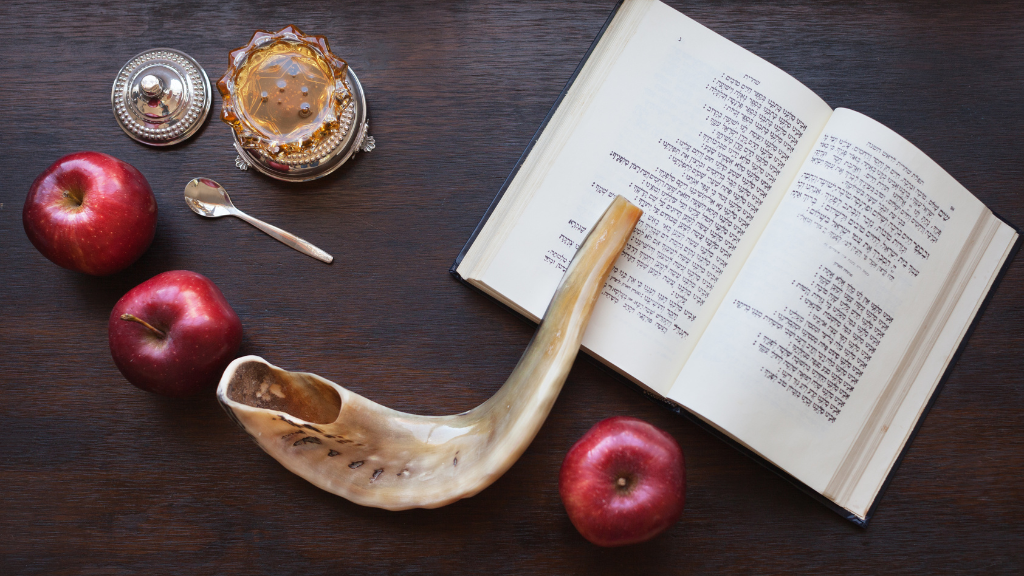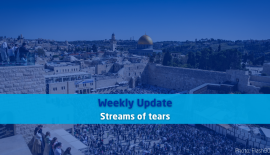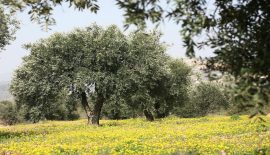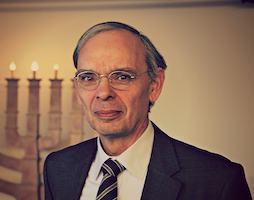Rosh Hashanah: The Feast of Trumpets
Rosh Hashanah is the beginning of the year in the seventh month, the month of Tishri. It is called this way because the Sabbath and Jubilee years are counted from this day. The Bible calls it the Feast of Trumpets or rather of blowing the shofar (Leviticus 23:23). Rosh Hashanah is the first of ten days ending with the Day of Atonement. These days are also called the Days of Awe.
Rosh Hashanah recalls the very first days of the world, ending with the day of the creation of man. The time of creation must correspond to the autumn, the time of Rosh Hashanah, for when the trees were created on the third day, they bore ripe fruit (Genesis 2:8-9). In Israel, it is the time of the late harvest.
On Rosh Hashanah and on the Day of Atonement, the shofar is blown a hundred times as a call for repentance and self-examination. That is how the year begins!
According to tradition, the Shofarot (blasts on the shofar) call to mind as many as ten things:
1. You are a creature of God
2. Your destination, your vocation, is life with God.
3. You have received God’s word, His instruction. The gift of the Torah at Sinai was also accompanied by the sound of the shofar (Exodus 19:19).
4. The destruction of the temple because of sin.
5. The danger that surrounds Israel in this broken and disconnected world. In this sense, the blowing of the shofar on New Year’s Day is also an alarm (Joel 2:15).
6. The day of judgment. This is only a rehearsal of the day of the final judgment.
7. The sacrifice of Isaac and the complete dedication of the fathers to God. Their merits.
8. God remembers His covenant with Israel.
9. God’s love is greater than His wrath.
10. And finally, the redemption of Israel and the gathering of all God’s people is remembered (Isaiah 27:12-13).
On Rosh Hashanah and on the Day of Atonement, the shofar is blown a hundred times as a call for repentance and self-examination. That is how the year begins!
Prayers
On New Year’s Eve, special prayers are said, consisting of verses from the Bible:
a. The Malchuyot (‘Kingships’), proclaiming God’s Kingship;
b. The Zichronot (remembrances), calling to mind the faithfulness of God;
c. and the Shofarot, verses that speak of blowing the trumpet.
Sermon on the Mount
I am convinced that it was during this period that Jesus delivered the Sermon on the Mount with the answer to the question of how to pray and teach about fasting, about prayer in the inner chamber, about almsgiving and about forgiving each other as a prerequisite of receiving forgiveness from God. These are the themes of the Days of Awe still considered in Judaism.
I believe that the Gospels and the Apostolic letters are full of references to the Ten Days of Awe!
To give just one example: Maimonides, the great medieval Jewish lawgiver and philosopher, writes concerning Rosh Hashanah:
“Awake, ye who are in a daze and ye who are in a deep sleep: who in the unreality of this age have forgotten the truth and run after the trifles, look within yourselves.”
Then Paul in Romans 13:8, “Owe no one anything but to love one another, for he who loves another has fulfilled the law.” Romans 13:11,“And do this, understanding the present time, the hour has already come for you to wake from your slumber, because our salvation is nearer now than when we first believed. The night is nearly over; the day is almost here!”
The New Testament proclaims that the Lord Jesus is the one to whom God has given the judgement. John 5:28:
“Do not be amazed at this, for time is coming when all who are in their graves will hear his voice, and will come out—those who have done what is good, will rise to live, and those who have done what is evil will rise to be condemned.” And Christ will gather the nations and judge them on how they have treated his own brothers and sisters (Matthew 25).
And now? I am alive, I am a creature of God, I am walking around, and the time is near, the summer, the heat is over. How do we prepare ourselves? What did Jesus say? By fasting, prayer, mercy and love.
Prayer: Our Father, your Kingdom come, but also pray for peace for Jerusalem.
Mercy: We also hear God say (Isaiah 40:1): “Comfort, comfort my people. Tell her that her suffering is over.” A cup of water, a garment to wrap oneself in against the cold, as a symbol of the love for God’s people after all the hardships after all the guilt also of the church.
Summer is over, a new season is about to begin, we say, and in the synagogue, we hear the shofar sounding, not once, not twice, as many as a hundred times, and we are searching for our destination.
How radiant the church will be when Christ will come and find His church at the side of the children of His people.






